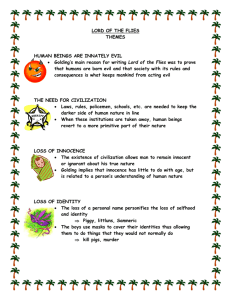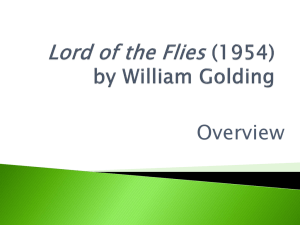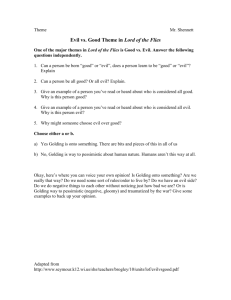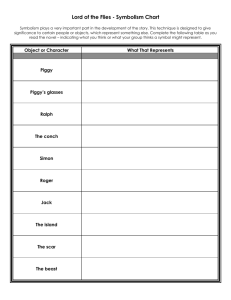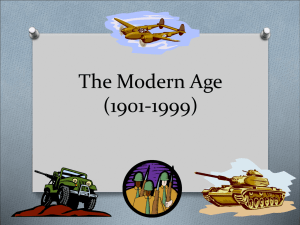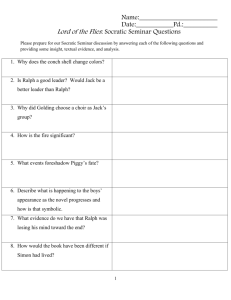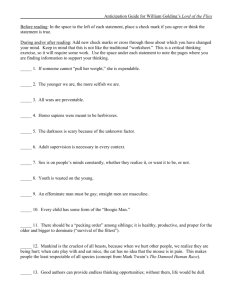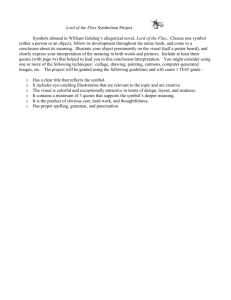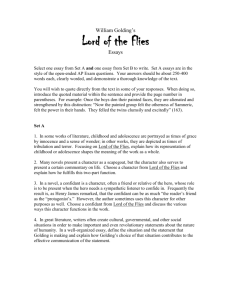Power and Authority in LOTF.doc
advertisement
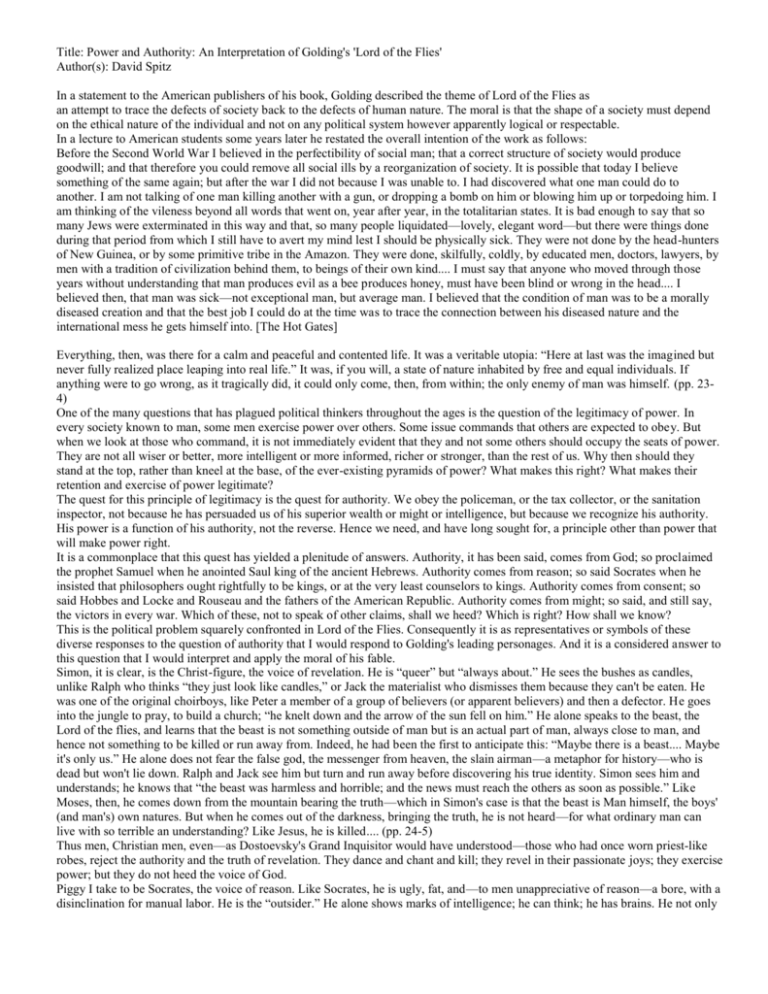
Title: Power and Authority: An Interpretation of Golding's 'Lord of the Flies' Author(s): David Spitz In a statement to the American publishers of his book, Golding described the theme of Lord of the Flies as an attempt to trace the defects of society back to the defects of human nature. The moral is that the shape of a society must depend on the ethical nature of the individual and not on any political system however apparently logical or respectable. In a lecture to American students some years later he restated the overall intention of the work as follows: Before the Second World War I believed in the perfectibility of social man; that a correct structure of society would produce goodwill; and that therefore you could remove all social ills by a reorganization of society. It is possible that today I believe something of the same again; but after the war I did not because I was unable to. I had discovered what one man could do to another. I am not talking of one man killing another with a gun, or dropping a bomb on him or blowing him up or torpedoing him. I am thinking of the vileness beyond all words that went on, year after year, in the totalitarian states. It is bad enough to say that so many Jews were exterminated in this way and that, so many people liquidated—lovely, elegant word—but there were things done during that period from which I still have to avert my mind lest I should be physically sick. They were not done by the head-hunters of New Guinea, or by some primitive tribe in the Amazon. They were done, skilfully, coldly, by educated men, doctors, lawyers, by men with a tradition of civilization behind them, to beings of their own kind.... I must say that anyone who moved through those years without understanding that man produces evil as a bee produces honey, must have been blind or wrong in the head.... I believed then, that man was sick—not exceptional man, but average man. I believed that the condition of man was to be a morally diseased creation and that the best job I could do at the time was to trace the connection between his diseased nature and the international mess he gets himself into. [The Hot Gates] Everything, then, was there for a calm and peaceful and contented life. It was a veritable utopia: “Here at last was the imagined but never fully realized place leaping into real life.” It was, if you will, a state of nature inhabited by free and equal individuals. If anything were to go wrong, as it tragically did, it could only come, then, from within; the only enemy of man was himself. (pp. 234) One of the many questions that has plagued political thinkers throughout the ages is the question of the legitimacy of power. In every society known to man, some men exercise power over others. Some issue commands that others are expected to obey. But when we look at those who command, it is not immediately evident that they and not some others should occupy the seats of power. They are not all wiser or better, more intelligent or more informed, richer or stronger, than the rest of us. Why then should they stand at the top, rather than kneel at the base, of the ever-existing pyramids of power? What makes this right? What makes their retention and exercise of power legitimate? The quest for this principle of legitimacy is the quest for authority. We obey the policeman, or the tax collector, or the sanitation inspector, not because he has persuaded us of his superior wealth or might or intelligence, but because we recognize his authority. His power is a function of his authority, not the reverse. Hence we need, and have long sought for, a principle other than power that will make power right. It is a commonplace that this quest has yielded a plenitude of answers. Authority, it has been said, comes from God; so proclaimed the prophet Samuel when he anointed Saul king of the ancient Hebrews. Authority comes from reason; so said Socrates when he insisted that philosophers ought rightfully to be kings, or at the very least counselors to kings. Authority comes from consent; so said Hobbes and Locke and Rouseau and the fathers of the American Republic. Authority comes from might; so said, and still say, the victors in every war. Which of these, not to speak of other claims, shall we heed? Which is right? How shall we know? This is the political problem squarely confronted in Lord of the Flies. Consequently it is as representatives or symbols of these diverse responses to the question of authority that I would respond to Golding's leading personages. And it is a considered answer to this question that I would interpret and apply the moral of his fable. Simon, it is clear, is the Christ-figure, the voice of revelation. He is “queer” but “always about.” He sees the bushes as candles, unlike Ralph who thinks “they just look like candles,” or Jack the materialist who dismisses them because they can't be eaten. He was one of the original choirboys, like Peter a member of a group of believers (or apparent believers) and then a defector. He goes into the jungle to pray, to build a church; “he knelt down and the arrow of the sun fell on him.” He alone speaks to the beast, the Lord of the flies, and learns that the beast is not something outside of man but is an actual part of man, always close to man, and hence not something to be killed or run away from. Indeed, he had been the first to anticipate this: “Maybe there is a beast.... Maybe it's only us.” He alone does not fear the false god, the messenger from heaven, the slain airman—a metaphor for history—who is dead but won't lie down. Ralph and Jack see him but turn and run away before discovering his true identity. Simon sees him and understands; he knows that “the beast was harmless and horrible; and the news must reach the others as soon as possible.” Like Moses, then, he comes down from the mountain bearing the truth—which in Simon's case is that the beast is Man himself, the boys' (and man's) own natures. But when he comes out of the darkness, bringing the truth, he is not heard—for what ordinary man can live with so terrible an understanding? Like Jesus, he is killed.... (pp. 24-5) Thus men, Christian men, even—as Dostoevsky's Grand Inquisitor would have understood—those who had once worn priest-like robes, reject the authority and the truth of revelation. They dance and chant and kill; they revel in their passionate joys; they exercise power; but they do not heed the voice of God. Piggy I take to be Socrates, the voice of reason. Like Socrates, he is ugly, fat, and—to men unappreciative of reason—a bore, with a disinclination for manual labor. He is the “outsider.” He alone shows marks of intelligence; he can think; he has brains. He not only thinks; he knows himself as well as other men. “I done some thinking. I know about people. I know about me. And him.” When he wears his spectacles he can see; he is like Plato's philosopher who has emerged from the cave. Those same spectacles not only shed light; they make possible the lighting of the fire which is meant to be seen. And when he is deprived of those spectacles, he loses his rationality too. He has a sense of what is required for society. He calls for order and justice—“put first things first and act proper“— and appeals to what is right. Though Ralph discovers the conch, it is Piggy who understands its significance as a symbol of legitimacy, an instrument of reason and order.... Like Socrates in the Phaedo seeking to remove the child-like fears of Simmias and Cebes, it is Piggy who reminds the others not to act like children but to behave like grown-ups. Above all, it is he who recognizes that there is no beast and no fear—“unless we get frightened of people.” All in all, he is indeed “the true, wise friend.” But Piggy too is killed, and with his death all sense, all reason is gone; the ultimate in madness sets in. Authority must be found elsewhere, for men accept reason no more than they do revelation. Ralph is democratic man, the symbol of consent. “There was a mildness about his mouth and eyes that proclaimed no devil.” He was “set apart” not by virtue or intelligence or other sign of personal superiority—though he may well have been the tallest and strongest of the boys—but by the fact that it was he who had blown and possessed the conch, who had exercised the symbol of legitimacy. Chosen chief by an election, he sought always to maintain parliamentary procedures, to respect freedom of speech, to rule through persuasion, with the consent of the governed. He was not an intellectual, but he “could recognize thought in another.” He could gain understanding from Piggy and had “the directness of genuine leadership,” as he demonstrated when he consoled and (temporarily) won over the opposition candidate by naming him second-in-command, by putting him in charge of the hunters. But Ralph too is rejected. The boys secede from his rule; they destroy the conch; and ultimately, their passions inflamed, they seek even to put him to death. Thus consent, like reason and revelation, is abandoned as a principle of authority. The “three blind mice” having been shunted aside, what finally is left is force, naked power. (pp. 25-7) Jack then, is authoritarian man. Like Hitler and Mussolini, he came out of an authoritarian tradition; himself a Satanic figure with his red hair and black cape, he was also the leader of a black-capped and black-cloaked gang that marched in step—“something dark [that] was fumbling along“—and followed orders. His “was the voice of one who knew his own mind,” and when it was suggested that there ought to be a chief he immediately and arrogantly demanded that position for himself. Defeated in an election, he took command of the hunters, the forces of naked power. “We'll have rules!” he cried excitedly. “Lots of rules! Then when anyone breaks 'em—” But his desire for many controls did not of course extend to controls he disliked, to those over himself. Then he rejected the rules and claimed the right to decide for himself.... Madness came often into his eyes, and when as hunter and warrior he again cloaked himself, this time behind a mask of paint, he lost all inhibitions; “he was safe from shame or self-consciousness”; he gave full vent to his passions. The conch, as Piggy said, was “the one thing he hasn't got”; and when he sought to assert his leadership through its use he blew it “inexpertly” and then, finding that he could not have his way, set it aside “at his feet.” Eventually it was shattered by his henchman into a thousand fragments. Yet he prevailed. “Power lay in the brown swell of his forearms: authority sat on his shoulder and chattered in his ear like an ape.” Who and what, then, is the Lord of the flies? He is Beelzebub—a Greek transliteration of the Hebrew Ba'al Zevuv, which means Lord of the flies; or, as it is rendered in some New Testament texts, Beelzebul, which means Lord of dung, or Lord of a fly-ridden dung heap. As such, he is the personification of evil. He is the beast that is part of man. Having rejected God, man can look only to himself. Having rejected reason and consent, what remains within himself is only savagery and force. The boys are the flies and the beast, the evil, the senseless passion that is in man; in each and every man—in Jack, in Roger, even (under special circumstances) in Ralph and Piggy, even in you and me—is the Lord. This is possible because the boys live in the dark. In the light they would be ashamed; and he who has common sense, who—like Ralph—would live in the light, is an outcast. [The conflict between light and dark is a theme that seems to have absorbed Golding almost to the point of obsession. Recalling his youthful days, for example, he speaks of the moment when he realized that the dead in the neighboring graveyard lay with their heads under his wall, their bodies under his lawn. “The lawn, almost the only uncontaminated place in that ancient neighborhood, had been sunny and innocent until my deliberate exercise of logic had invited the enemy in. Who was that enemy? I cannot tell. He came with darkness and he reduced me to a shuddering terror that was incurable because it was indescribable.” (The Hot Gates) But to Golding the child, as to Piggy, the solution lay in science. “Science was busy clearing up the universe. There was no place in this exquisitely logical universe for the terrors of darkness. There was darkness, of course, but it was just darkness, the absence of light.... God might have been a help but we had thrown Him out ... (ibid.). To the mature Golding, of course, science too ceases to provide the answer (ibid.).] With the triumph of the Lord of the flies, the darkness in man's heart, Ralph weeps for the end of innocence. But the final, most devastating, most ironic note has yet to be sounded. For at the very moment when Ralph thinks he is saved, when all the children are saved, by the appearance of adults on the island, we know that he and they are not really saved. For the man who heads the adults who have come to rescue them is a naval officer, also a leader of hunters; and the ship to which he will take them is a battle cruiser, which cannot carry them back to the safe shore (England), since that shore is now in ruins, but will itself soon be engaged in a hunt for the enemy—man—in the same implacable way as Jack and his deranged followers hunted Ralph. The boys move not from one evil to another evil, but from one aspect or level to another of the same evil; they go from the Lord of the flies writ small to the Lord of the flies writ large. For power based on the authority of force has been supplanted not by a different principle of authority, but only by another, though greater, power based also on the authority of force. And who, or what, will control this greater power? So the moral remains the same: when all else fails, clubs are trumps. And all else must fail. So, at least, Golding would have it appear. But is this really so? Has Golding proved his case? His case, let it be recalled, is that evil is innate in man; that even the most suitable environmental conditions, unmarred by all the customary factors that have distracted and corrupted men in the past, will not suffice to overcome man's capacity for greed, his innate cruelty and selfishness; and that those, therefore, who look to political and social systems detached from this real nature of man are the victims of a terrible, because self-destructive, illusion. His method is to create a civilization out of innocence, to detach a group of the best of our very young and to put them into a state of nature, there to found a civil society on such principles of decency as seem to them appropriate, and to follow with a close and careful eye their inevitable course of destruction. His evidences are the events that constituted that course. Now a novelist is not a historian; much less so is the author of a myth or fable. We cannot submit his work, therefore, to the standards and tests of historical or anthropological research. (For this reason I omit from consideration here what would otherwise be, I think, a telling criticism of Golding's argument: namely, that evil inheres not simply in man but also in collectivities; institutions, and social forces.) But we can judge him by his own method and evidences. And here, while I do not doubt that Golding has called our attention to a profound but partial truth, to what he has strikingly and properly called “the terrible disease of being human,” I would contend that—precisely because he has built on but a partial truth—he has fallen short, far short, of establishing his case. For what Golding has forgotten is that a state of nature is not necessarily a state of political and moral innocence. The boys who inhabited the island did not spring up full-blown, as did Athena from Zeus's head. They were the carefully chosen products of an already established middle-class society. They were socialized in, and were a partial microcosm of, twentieth century English (or Western) civilization; and they had brought that civilization, or what fragments of it they could remember, with them. Hence the values they possessed, the attitudes they displayed, the arrangements they established, and the practices in which they engaged, were all in some degree or other a reflection of the world into which they had been born and within which they had been educated and fashioned. Jack and the choirboys, for example, had brought with them a system of order based on authoritarianism, and had been habituated to the wearing of masks (their uniforms) which set them apart, and enabled them to act differently from other men. Piggy brought his spectacles, an artificial aid provided by the civil society in which he had lived; and so conditioned had he been by that society that with those spectacles he saw precisely those democratic and middle-class values that that society esteemed, he appealed repeatedly to science and to what grown-ups would think. Maurice, who in his other life “had received chastisement for filling a younger eye with sand,” now, despite the absence of a parent who might let fall a heavy hand, felt the unease of wrong-doing when he committed the same act, and hurried away. Even Roger, around whom the hangman's horror was later to cling, was initially bound by the taboos of the old life. (pp. 27-30) Hence we still don't know, any more than we know from the story of Robinson Crusoe, what man, innocent, naked, non-socialized man is really like. We still don't know what is innate and what is environmentally conditioned in man. Nor can we ever hope to attain this sort of knowledge; for the individual apart from society is an inconceivable thing—he is always, no matter how peculiar or unique a person, still a social animal. And if it be said, despite this, that all societies are evil, or that there is evil in all societies, which means that men however created or evolved are necessarily the source of that evil, it is still not shown what in man or in his circumstances produces that evil, or why, and whether this is irredeemable. Golding's truth, if truth it be, is thus true only for his English schoolboys, and those of like circumstances. It is not necessarily true of the products of other cultures and civilizations, or of other times. This point merits pursuit. If Golding is right, if “the shape of a society must depend on the ethical nature of the individual,” and if that nature is innately evil, then every society must be rooted in naked or arbitrary force; every society must be evil; every society must be, in this sense, the same. But every society is not the same. Horrors and indecencies abide, to be sure, in every society; but the horrors and indecencies that Golding encountered in the concentration camps of Nazi Germany were outrages of a different degree, perhaps of a different order, than those to be found in some other states. Does this not suggest that the problem of human bestiality is more complex, more factor-bound, than the single-factor explanation Golding makes it out to be? That the customs and traditions of a people, their ethical precepts and practices socialized through education and over time, even perhaps their social and political arrangements, make a difference? Plato's Socrates was clearly wrong in looking only to the rule of good men, on the ground that such men, precisely because they were good, would act virtuously and need not therefore be restrained by laws. Good men will not always be at the helm, and in any case they are not likely to remain good very long; they too are subject to the temptations and corrosive effects of power. Hamilton and Madison, influenced by Hobbes and Hume, did not make that mistake; but by leaping to the other extreme they made a mistake of their own. With Golding, they seized on a partial truth and extended it to a universal falsehood. Thus Hamilton, following Hume, argued that it must be accounted a maxim that, in contriving any system of government, and fixing the several checks and controls of the constitution, every man ought to be supposed a knave; and to have no other end, in all his actions, but private interest. By this interest we must govern him; and, by means of it, make him co-operate to public good, notwithstanding his insatiable avarice and ambition. Without this, we shall in vain boast of the advantages of any constitution. Whether the auxiliary precautions devised by the framers of the American Constitution have in fact been the best, have in fact been adequate to curb the injustices that men have tolerated or indeed have visited upon other men, is not here at issue. Clearly, they have left all too much undone. What is crucial, however, is not Hume's statement that all men must be considered knaves, which they are not, but the perception by Hamilton and Madison that many are in fact so and others might well become so; hence it behooves us to build our political arrangements with a careful regard to this danger, with a view to preventing, so far as we can, some at least of the consequences that readily flow from “the terrible disease of being human”; and that they may well have succeeded in mitigating those dangers. It would be foolhardy for contemporary man not to go on from there, as have Tocqueville and John Stuart Mill and a host of other theorists. Now Golding has himself admitted that intelligence and historical knowledge are of supreme importance and relevance in meeting this problem. It is, he has said, in “that attempt to see how things have become what they are, where they went wrong, and where right, that our only hope lies of having some control over our own future. [The Hot Gates] If this is so, if there is some hope of controlling our future, then the hypothesis of innate evil is but partly right, and therefore partly wrong. It cannot by itself explain the governance of mankind. The matter cannot rest here. Every society does indeed, in some measure at least, rest on force. We may appeal to God, even claim (as we now officially do) that this is a nation “under God.” ... But we, along with every other so-called civilized nation, nonetheless maintain an army and police force. Without them, or so it is believed, the state cannot survive, or do the job it purports to do. Without them, or so it is believed, we cannot resist the will of greater powers or impress our will on those with lesser force. Yet it remains true that while a people may do many things with bayonets, they cannot sit on them. Force alone is not enough: it neither unites the nation that employs it, nor sustains the nation that is formed after its use, nor controls a people that has been subjugated by it. (pp. 31-2) We are caught, then, in a pathetic dilemma: we cannot seem to do without force, and in this respect every society runs the risk of being oppressive; but we cannot do without justice, and in this respect force becomes not an end but a means, an instrument in the service of right. But the use of violent means tends always to corrupt the user and may well distort, and render unattainable, the desired end. Suppression even in the service of right is still suppression, and that, if not wrong, is but painfully right. So we seem to be back where we began. There is power, and there is authority; and how to bring them together in the name of justice—whether of reason, revelation, or consent—may well exceed, if not the imagination, at least the practical capacities of mortal man. This, too, may be a part of the terrible disease of being human. However, what is perhaps more astonishing is not that there is so much evil in the world but that there is a measure of good; not that there is so much violence but, occasionally, a period or a place that knows a degree of amity and peace; not that there is so much selfishness and greed but, from time to time, a touch of altruism—and it matters not here whether this is called enlightened selfinterest or sacrifice—and decency.... It is also true that in our social and political arrangements and practices we are far from realizing our avowed democratic ideals; but to confuse this dreadful failure with the worst practices of totalitarian or repressive systems is hardly an expression of responsible judgment. This is not to excuse evils, or fatuously explain them away. It is merely to say that while no human society is completely without evil, the fact that there are differences in the levels of evil among societies indicates that factors other than “man” or “evil in man” play an important role. They make a real difference in the quality of human existence. They warrant the hope, expressed by prophets and democratic thinkers, that in principle an ideally good society may be approximated if not attained. Some societies, some political and social systems, are in fact less vile than others. The evil that is common to them all cannot causally account for that which distinguishes them from each other. (pp. 32-3) Source Citation Spitz, David. "Power and Authority: An Interpretation of Golding's 'Lord of the Flies'." The Antioch Review 30.1 (Spring 1970): 21-33. Rpt. in Contemporary Literary Criticism. Ed. Roger Matuz and Cathy Falk. Vol. 58. Detroit: Gale Research, 1990. Literature Resource Center. Web. 18 May 2010.
